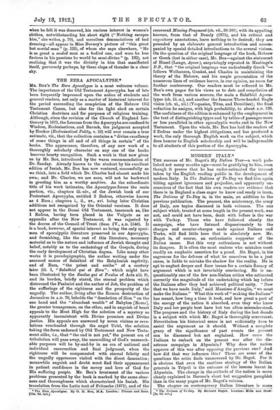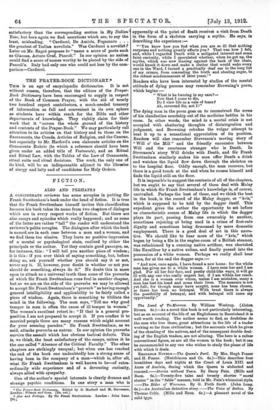MODERN ITALY.*
THE success of Mr. Bagot's My Italian Year—a work pub. lished not many months ago—must be gratifying to him, even though it proves that he has under-estimated the interest taken by the English reading public in the development of modern Italy. In The Italians of To-Day we find him again tilting against ignorance and prejudice, and apparently un- conscious of the fact that his own readers are evidence that there is in England a class eager to know and ready to learn. The Italians of To-Day is, in the main, an addition to the previous publication. The peasant, the aristocracy, the army of Italy, are topics discussed in both volumes. The one subject which, treated at some length in the present work, was not, and could not have been, dealt with before is the war with Turkey. Those who have followed closely the campaign, who have listened dispassionately to the charges and counter-charges made against Italians and Turks, will find little here that is absolutely new. Mr. Bagot is, of course, an enthusiastic supporter of the Italian cause. But this very enthusiasm is not without its dangers. It is often the most zealous who mistakes most readily an emphatic assertion for a proof. Mr. Bagot, in his eagerness for the defence of what he conceives to be a just cause, is liable to mistake the shadow for the reality. He is apt to neglect deeper and finer issues for a certain fluency of argument which is not invariably convincing. He le un- questionably one of the few non-Italian critics who estimated correctly the magnitude of the undertaking which lay before the Italians after they had achieved political unity. " Now that we have made Italy," said Massimo d'Azeglio, " we must make the Italians." What this work of " making the Italians" has meant, how long a time it took, and how great a part of the energy of the nation it absorbed, even they who know Italy and her people best have but too often misunderstood. The progress and the history of Italy during the last decade is a subject with which Mr. Bagot is thoroughly conversant. Nevertheless his historical sense is not sufficiently keen to assist the argument as it should. Without a complete grasp of the significance of past events the present can be discussed but not explained. How came the Italians to embark on the present war after the dis- astrous campaign in Abyssinia ? Why does the nation approve of this war after opposing the previous one ? And
how did that war influence this ? These are some of the questions the critic finds unanswered by Mr. Bagot. For it is obvious that even the cautious strategy of the Italian generals in Tripoli is the outcome of the lessons learnt in Abyssinia. The change in the attitude of the nation is more clearly explained in Barone's short but suggestive pamphlet than in the many pages of Mr. Bagot's volume.
The chapter on contemporary Italian literature is more
• The Italians of To-Day. By Richard Bagot. London: Mills and Boos., [2s, 6d. net]
satisfactory than the corresponding section in My Italian Year, but here again we find assertions which are, to say the least, misleading. " Carducci, De Amicis, Fogazzaro . . . the greatest of Italian novelists." Was Carducci a novelist P Later on Mr. Bagot proposes to "name a score of poets such as Giacosa, Arturo Graf, Pascoli." In our opinion no nation could find a score of names worthy to be placed by the side of Pascoli's. Italy had only one who could not lose by the com- parison—Carducci.







































 Previous page
Previous page